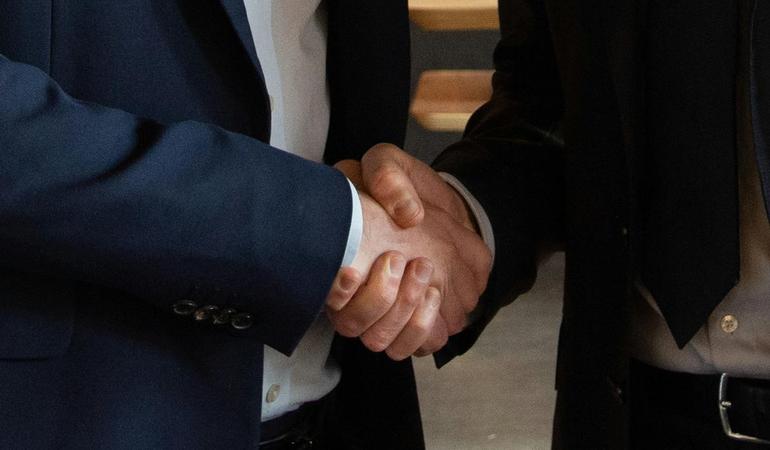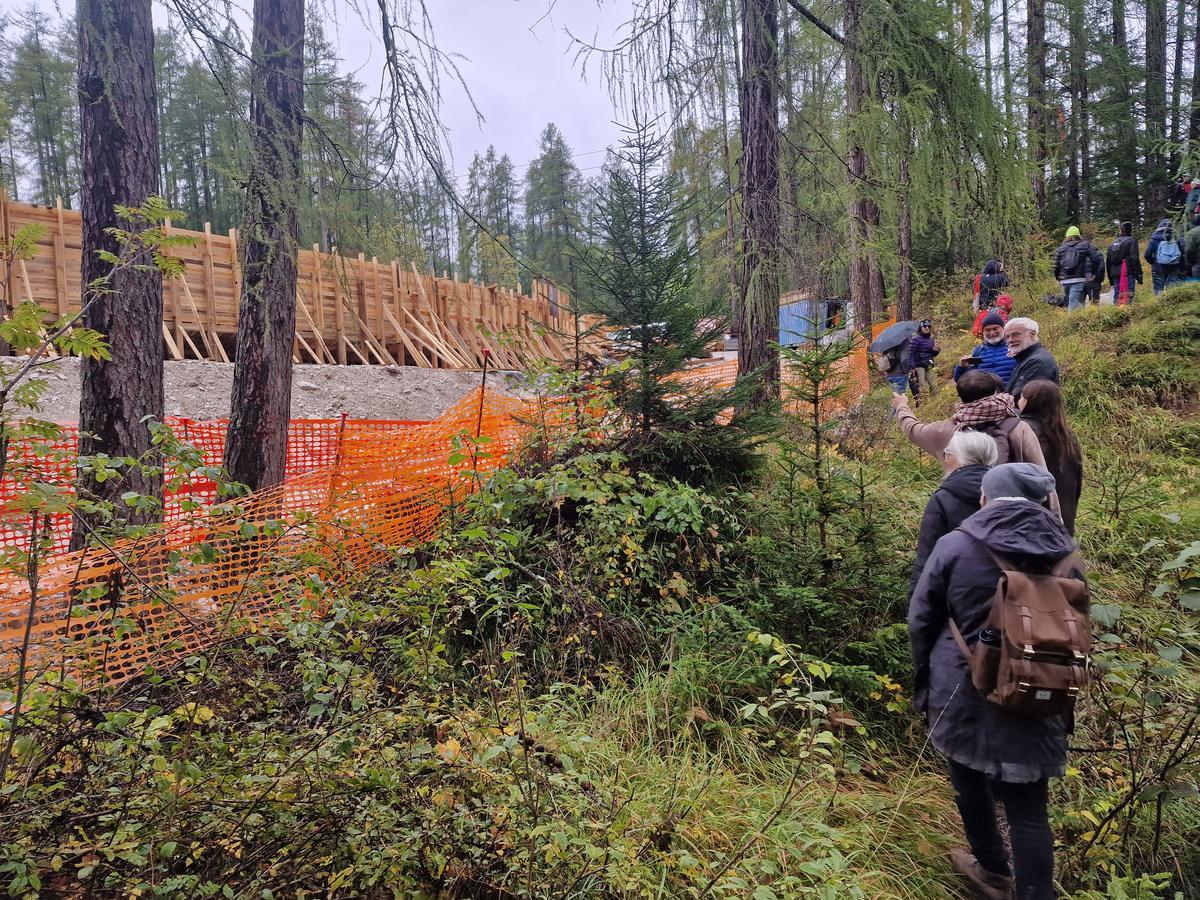
Corruzione legalizzata: massimizzare i profitti, minimizzando il rischio penale



18 aprile 2025
Not everyone is pleased by the bottom-up control of what happens on the construction sites of the future Olympics in Milan-Cortina 2026. The publication of the second Open Olympics report on the transparency of the Games, by a network of more than twenty associations, and above all the media echo that followed, provoked the reaction of Simico, the public company that manages the construction of the works, and the comments of the minister of infrastructure Matteo Salvini: on social media he lashed out at 'the no-men', first generalising between those who do not want large-scale works and those who demand to know how public money is spent, and then raising the doubt that they themselves sabotaged the bobsleigh track, a few days before the International Olympic Committee's visit to Cortina.
There is less than a year to go before the Winter Olympic Games in which Italy will play a leading role: little time to speed up the construction of the works, while maintaining a high level of attention on safety at work and the protection of the territories that in Veneto, Trentino Alto-Adige and Lombardy will see great changes in view of the world kermesse. A week after 'One year to go', the institutional ceremony on 6 February at the Strehler Theatre in Milan praising job creation and a winning model, the publication of the Open Olympics report with its demands for greater transparency for the good of all citizens did not have the same effect.
Beyond the controversy, what is certain is that, with just over eleven months to go before the Games begin, there are (at least) three open fronts. The first two are safety at work - with the signing of the protocol between the Ministry of the Interior, employers' associations and trade unions - and the public or private nature of the Milan-Cortina Foundation, on which the National Anti-Corruption Authority (Anac) has also expressed its opinion. The third aspect, broader and with more nuanced contours, concerns the criminalisation of civil society, which demands to know how public resources are spent, by those who manage them and by government representatives. What seems to be most annoying is that it is talked about publicly and that newspapers and TV stations can own up to this demand for transparency.
Civil society groups start a civic monitoring on the Milano-Cortina Winter Olympics
The second published report of the Open Olympics campaign put under the magnifying glass the information published by Simico, on the portal created by the company for transparency, launched last October and updated every 45 days, where information on 94 works can be obtained. The report acknowledges the steps taken by Simico to make the status of the works available for consultation, but makes further demands for transparency on four points: to be able to know the number of all projects related to the Olympics, the actual cost and who will have to pay, the environmental impact of the works, and the guarantee of controls to protect labour and the environment, despite the tight schedule.
A few hours after the publication came a note from Simico, who judged the contents of the report as 'unacceptable instrumentalisation' and stressed that 'the construction sites of the sports works are proceeding in full compliance with the established timing and all will be completed before the Olympic and Paralympic Games [...]. To claim otherwise is not false, but absolutely defamatory'.
The company answered the associations' four civic questions. On the fact that only 94 works are listed on the portal, the company dwelt on the 'remodifications implemented in November' that led to 'the amalgamation of some unique project codes'. Although the associations had already referred to this type of change in the report. He added: "Works that are not indicated by the Dpcm even if they are related to the Games do not pertain to Simico," thus excluding the contracts of other entities that are carrying out works related to the Olympics. On the issue of transparency on funding sources, Simico appeals to the September 2023 decree, in which the Milan-Cortina 2020-2026 Olympic Works Plan is approved. While on the issue of labour and environment, which Simico considers to be summarised in the legality controls, the company explained that it has signed a protocol to create a tool against 'any risk of criminal infiltration'. In addition to this, he reiterated that the sports facilities 'are all aligned to the timetable'.
In conclusion, Simico 'notes that despite the effort, the desire to instrumentalise data has led to a misreading of the current state of affairs'. A reading from which the company 'disassociates itself in all respects, reserving any further assessment in the appropriate fora'. The note left the associations baffled, and they publicly retorted that they were simply asking for further information on 'how, by acting quickly, we want to protect work, the environment and controls'.
On 26 February, Simico president Veronica Vecchi took part in the public meeting of the joint Olympics and Anti-Mafia commissions of the Milan City Council. During her speech, she said she appreciated the rigorous scientific method with which the associations' research had been conducted, explaining that in her opinion 'the problem was the press'. He then invited Libera, which is one of the associations in the Open Olympics network, not to take 'this opportunity for political instrumentalisation. Or else I will close the page of the Milan-Cortina works'. Assumptions that even some councillors of the Milan municipality have tried to dampen. In short, monitoring can also be fine, as long as it is done between gentlemen and gentlewomen: one should not excite public attention too much. Exactly the opposite of the spirit behind civic monitoring.
World Anti-Corruption Day: the best way not to stamp out bribery
Another chapter in this story concerns the Milan-Cortina 2026 Foundation, which carries out all the activities of organising, promoting and communicating the sports and cultural events of the Olympics.
In the report, the associations expressed concerns about the possible public resources that will be invested in the event that the final costs of the event exceed the revenues. This is what is contained in the company's budget document, which emphasises that the responsibility for replenishing the accounts in the red will then lie with the public authorities. The report highlights the public figure for the budget at the end of 2023, which showed that the deficit amounted to EUR 107 million. However, since the foundation considers itself to be a private entity, no detailed expenditure items have been made public at the moment.
Anac has commented on this point in a note by its president Giuseppe Busia dated 14 February 2025, which contains an in-depth analysis of the Foundation's framework. The purpose of Anac's work was to ascertain whether indeed the Foundation could continue to be considered a private body and not equated to a public law body, and thus be subject to anti-corruption and transparency regulations. Anac clarified that the assumption by the public hand of the commitment to repay any debt places 'the Foundation safe from any business risk, which ultimately [...] ends up falling on the public entities operating through the Foundation'.
Anac concluded: 'The guarantee of public coverage, which, as far as can be deduced, appears to be without any limit on the amount, hardly allows the Foundation to be qualified as an enterprise acting according to commercial logic'. In short, for the Authority, 'the Foundation appears to be configurable as a body governed by public law' because it will be public money that will clear any debts. And therefore it must comply with transparency obligations.
TV and newspapers gave ample space to this document only ten days later. At that point, the Milan-Cortina 2026 Foundation, in a note dated 23 February, let it be known that it had mandated its lawyers to challenge the communication it had received from Anac, considered 'an atypical act, late in timing' before the regional administrative court of Lazio. For the organising committee, the communication contains 'an incorrect interpretation, as well as an incomplete reconstruction'.
2026 Winter Olympics in Italy: the Olympic village in Cortina will no longer be demolished
Andrea Monti, communications director of the Milan-Cortina Foundation, during the 26 February meeting of the joint Olympics and Anti-Mafia commissions of the Municipality of Milan reiterated the concept already expressed by Simico's president Vecchi: 'I do not believe that a balanced communication has been made on this report. Net of some judgements that I do not share, we are here because we believe in transparency, but the foundation is a private entity that is in the market and lives in the market. The legal nature is specified by a statute that has not changed and focuses on sustainability based on commercial exploitation. The deficit in the first years is higher because there are costs and a balanced budget will be the ultimate goal. What has been asked of Simico cannot be asked of Fondazione, because we have confidentiality agreements'. It’s up to the Regional Administrative Court (In Italian, the TAR) to decide how it will go on.
Two hours later, during question time in the Chamber, Green Left Alliance group leader Luana Zanella asked Sports Minister Andrea Abodi for explanations. He first reiterated that the Foundation operated under private law, therefore like a company, on the basis of its statute. He cited as examples the organising committees of past editions 'including that of Paris in 2024'. He then added: 'I have formally asked the Foundation for a technical-legal study to identify precisely which, if any, are the areas of applicability of the transparency regulations' and which activities should be subject to the obligations.
He concluded: 'In this case, transparency is a value and a guideline that must operate regardless, which cannot be renounced. I believe that the Foundation (with regard to some of the matters of public interest, ed.) in this sense must be like a glass house and that the actions of all those involved must remain guided precisely by the criteria of transparency and efficiency, also with respect to broad sustainability'. The goal of the Foundation, according to the minister, is to balance the budget.
In addition to public resources, the Open Olympics associations expressed their concern in the document about the timeframe for the realisation of the works, especially with regard to the safety of workers on the construction sites and the protection of the environment. If on the latter aspect, the decrees have made it possible to bypass many environmental impact assessments, on the former, namely safety, some progress has been made.
On 25 February, the Ministry of the Interior, employers' organisations and trade unions signed at the Viminale the protocol for legality on the construction sites where the Winter Olympics facilities are being built. Prefect Maria Teresa Sempreviva, head of the Interior Minister's cabinet, said that 'the agreement promotes safety, regularity and quality of work: if we do not invest in each of these elements, no challenge for our country can be won'.
Among the most important points of the agreement is the fight against cascade subcontracting, a practice that does not guarantee compliance with the rules on construction sites.
For the trade unions, 'this is a garrison of legality, operating to ensure contractual regularity, qualified professional training, and health and safety assistance' and 'an example of virtuous practice that can be extended throughout the country'. There will be a monitoring table to check any criticalities.
A few days earlier, the Carabinieri from Venice, Belluno and Cortina had carried out several checks at construction sites in the municipality of Cortina. On that occasion, serious safety irregularities had been detected for 12 construction companies, which had led to three business suspension orders and fines totalling 100 thousand euro.
In the succession of events, what caught the attention of Simico and the Ministry of Infrastructure was a refrigeration pipe weighing approximately 500 kilos that was found in a street on the construction site of the bobsleigh run being built in Cortina on the night between 20 and 21 February. The company's note reporting the incident made reference to the possibility that the pipe had 'been detached' intentionally. The government commissioner Fabio Saldini then spoke of a 'disrespectful act', which was also linked to the proximity of 24 February, the day on which the International Olympic Committee delegation was due to arrive in Cortina.
The official note from the ministry led by Salvini was not long in coming: 'What happened in Cortina, where unknown persons sabotaged the bobsleigh track, is disturbing and serious,' it reads. On Facebook, the League leader then added: "To the hatred and lividity of no-men we respond with the Italy of 'yes': on with the works, without stop and without fear!".
The investigators are examining whether it was really sabotage or an accident inside the construction site. The critical points with respect to the first hypothesis are several: the area is guarded, the incident occurred late in the evening and not in the middle of the night, the pipe is undamaged and it is difficult to move it without vehicles, given its weight.
Further inflaming the debate were the statements made by Alessandro Morelli, undersecretary to the Presidency of the Council, according to whom it was 'a gesture of ideological boycott, also fuelled by those who, through the media, even on public service channels, express ideological naysayers against the Olympics that, on antagonist fringes or deviant minds, lead to attitudes contrary to legality, with the risk of causing huge and potentially irreparable damage'. At this point, it was the Italian Federation of the Press itself, through its general secretary Alessandra Costante, who pointed out: 'It is a pity to hear, once again, that the media are considered to be the feeders of acts of sabotage'.
The conclusion of Costante's note is lapidary: 'Truly free and independent, plural and authoritative information gives voice to all the positions in the field and does not hide the news'.
A clear-cut position that responds to attacks on the press by those who, in so many positions of power, may be irritated by having to take 'public responsibility' for their actions. And who have already on several occasions resorted to the pretext of the 'reputation of the entire national community' to discredit anyone who questions - or simply wants to monitor - the work of those who have to manage billions of euro.
This article was translated by Kompreno with the support of DeepL.
La tua donazione ci servirà a mantenere il sito accessibile a tutti
La tua donazione ci servirà a mantenere il sito accessibile a tutti

